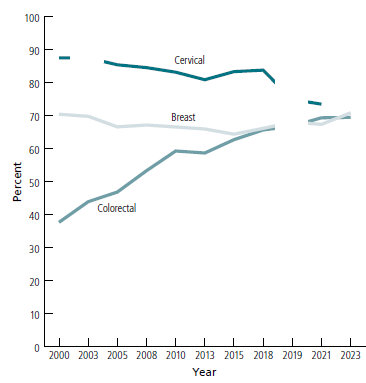ACS Research News
Filtering by:
DetectionNot Enough Females Are Being Screened for Cervical Cancer
Published on: April 25, 2025
Cancer Prevention & Early Detection report says cervical cancer prevention needs urgent attention. Good news: Fewer people smoke than ever before.
New Lung Cancer Screening Guideline Increases Eligibility
Published on: November 1, 2023
The updated ACS guideline recommends adults ages 50-80 who have a 20+ pack-year smoking history get screened with a low-dose CT scan each year.
Study: Lack of Education About Melanoma May Contribute to Black-White Survival Disparities
Published on: July 23, 2019
It’s true that people with darker skin have a lower risk of melanoma. But as a recent study showed, it’s also true that non-Hispanic Black Americans are more likely to have lower survival rates when they are diagnosed. That’s partly because compared with non-Hispanic whites, people with darker skin are more often diagnosed with later-stage melanoma (after it’s spread). It’s also because the most common type of melanoma among non-Hispanic Blacks—called acral lentiginous melanoma (ALM)—has a lower survival rate.
Study: More Colorectal Cancer Diagnoses in People Under 55 Aren't Only Because of More Colonoscopies
Published on: July 12, 2019
Colorectal cancer (CRC) is being diagnosed more often in the United States among adults younger than age 55. Does this mean more of them are getting colorectal cancer? Or are doctors finding it more often because more younger adults are having colonoscopies? In a study published in the Journal of Medical Screening, researchers at the American Cancer Society (ACS) found that colonoscopy trends don’t completely line up with the rates of colorectal cancer diagnosis by age, so more screening doesn’t fully explain the rise in CRC cases.









